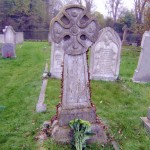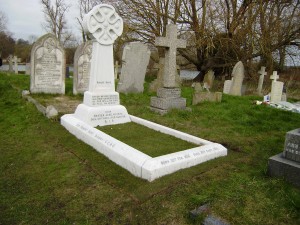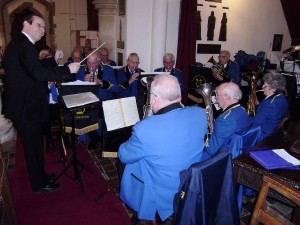BICC has been collaborating with Dr Weipin Tsai at Royal Holloway University of London, on her imaginative initiative to restore to public view the achievements of Sir Robert Hart, the Ulsterman who served from 1863-1911 as Inspector-General of the Chinese Maritime Customs Service. The first stage of this programme was completed on 22 February, when sixty guests assembled at All Saint’s Church in Bisham, near Marlow in Berkshire, for a ceremony to rededicate the gravestone of Sir Robert and Lady Hester Jane Hart.

Hart tombstone before restoration
The tombstone had been in danger of being removed, as it was in a decrepit state, but the team have had it professionally restored. On a freezing cold, but sunny morning, an audience of former diplomats, business figures, Chinese studies academics, several descendents of Customs staff, including descendents of Hart himself, and visitors from China, assembled for a simple rededication ceremony. The grave is but a few yards from the Thames, and there the Reverend Sara Fitzgerald led a service which included addresses on Hart’s spiritual life and motivations from Hans van de Ven, at Cambridge University, and on Hart’s contribution to Anglo-Chinese relations from Robert Bickers.

Sir Robert and Lady Hart’s tombstone after restoration, February 2013
Wreaths were then laid by Etain Alexander, great grand-daughter of Sir Robert, Deidre Wildy on behalf of his alma mater Queens’ University Belfast, Julie Shipley, Head of the Sir Robert Hart Memorial Primary School in Portadown, Dr Mary Tiffen, in memory of the Carrall family, and Weipin Tsai on behalf of The Royal Philatelic Society London, Taiwan Chapter; Chinese Taipei Philatelic Society; The China Stamp Society, Inc. Taiwan Chapter. (Hart was appointed to manage the new Imperial Chinese Post Office when it was established in 1896).

Waltham St Lawrence Silver Band, in All Saints’ Church, Bisham
In recognition of Hart’s place in the history of the European classical music’s reception in China — he organised and ran the first secular brass band in the country — the local Waltham St Lawrence Silver Band played a selection of pieces. These included some that are known to have been included in the programmes played by Hart’s own band in the gardens of his residence in Peking.
The ceremony was followed by a reception and presentations about Hart and his legacies, including his archive at Queens’ University Belfast Special Collections, and discussion of how the rich private archives of the British presence in China, not least its photographic records, can help furnish unique materials for understanding China’s modern history, its heritage, and social life and customs.
Hart joined the Customs in 1859, and 2013 marks the 150th anniversary of his formal appointment to the Inspector-Generalship. He was a Chinese civil servant, and never let the foreign nationals on his own staff forget this point, and he worked consistently to try and fashion structures and practices that would reduce the potential for tension between China and the foreign powers. He did not always succeed, but he undoubtedly had a significant impact on the course of events. Hart’s reputation has varied over the years. In Anglophone historical writing in the 1950s-60s he was presented as fairly central to any understanding of China’s interaction with foreign power, but thereafter new scholarly trends explored different fields and approaches and he largely fell out of sight. In China, until relatively recently, he was viewed simply as an agent of foreign, principally British, imperialism.
Attitudes in China today are more nuanced, and there has been a revival of scholarship internationally into the rich and varied history of the activities of Hart and his service. This event was part of a wider initiative, which will include a film, which aims to place Hart back into broader debates about British-Chinese relations, their history, contemporary features and their future. In particular, those state to state relations are at heart also relations between people, British and Chinese. In Hart, and the 22,000 foreign and Chinese staff of the Customs, and in the legacies of those careersdown to today, we have a rich field in which to explore how people shaped such abstractions as ‘Anglo-Chinese relations’.
The booklet accompany this commemorative event, Between Two Worlds: Commorating Sir Robert Hart, compiled by Weipin Tsai, can be found on the History of the Chinese Maritime Customs Service project website.



